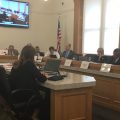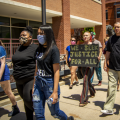
This post was written by Sarah McAfee, a former member of our team.
Well, I never expected to be writing about a toilet paper shortage, but here we are. Our household is six weeks into following public health orders to stay home as much as possible, and while our paper product supplies are temporarily sufficient, reserves of patience and sanity are definitely running low.
There’s a lot we’re all running low on these days. As COVID-19 infected our bodies and lives, those with the resources to do so purchased all the staples from grocery stores, and celebrities and athletes got first access to limited testing, while tens of millions of others have been forced to file for unemployment, families are waiting hours in line to get food boxes and other basic supplies, and immigrants without legal status (and their families) were totally left out of the $2 trillion stimulus bill.
We’re running dangerously low on laws and policies that provide equal protection for all. Not that this is new, of course, but pandemics have a way of exposing inequities that have existed since humans invented oppression. This has been made abundantly clear this month as data has been released about the disproportionate impact of COVID-19 on people of color. Across the country, the pattern has shown up state after state—black people, and people of color generally—are dying at much higher rates than white people. In Louisiana, blacks make up 32% of the population, but 70% of COVID-19 deaths. In Michigan, blacks are 14% of the population, but make up 41% of deaths. Here in Colorado, 3.9% of our population is black, compared to 6.8% of our COVID-19 deaths.
It’s important to be clear that this inequity is not because black people are genetically predisposed to this virus: it's systemic racism. Race is a social construct, meaning it’s something human-invented and not something biological, which means the reason for the inequity is also human-invented. One root cause of this inequity is that our laws and policies have limited access to living wages, paid leave, health insurance, and affordable housing for people of color, which leads to worse health outcomes. Another is that people of color are more likely to work in “essential” jobs (jobs that are low-paying, despite their essentialness) that have a lot of interaction with and exposure to the public, and thus, the virus. A third is that the US health care system has a long history of racism and violence against people of color, so there is an understandable mistrust of health care institutions, leading some to avoid care until it’s too late. A fourth is that all of these things put people of color at a higher risk for chronic illnesses, which increases the likelihood of a severe response to COVID-19. So again--it's systemic racism causing this inequity.
We’re all in this, but we’re not all in this together right now. The virus might not discriminate, but our laws and policies do. This pandemic has made it clear that we are interconnected—that we depend on each other to make our communities strong and healthy—so we need to start acting that way socially, politically, and economically. We must undo the systemic racism that is woven into the very fabric of our society and institutions; our goal cannot be to go back to the way things were. As Joe said recently, the time for radical action is now, and our communities can’t wait. It’s time to stock up on health equity (and toilet paper). Join us!




